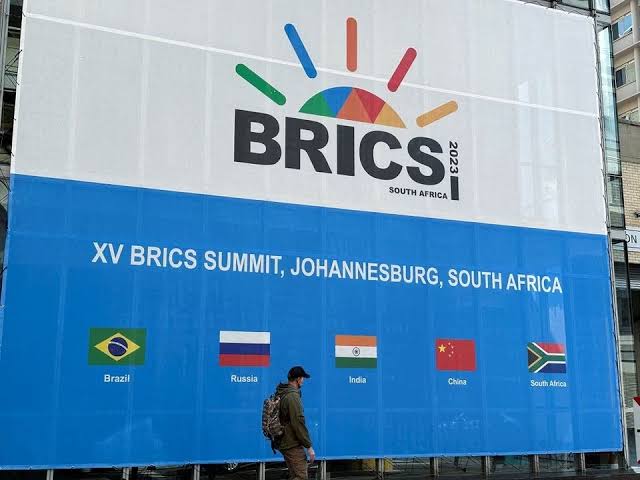NATO member seeking BRICS membership amid geopolitical tensions, should India permit this

BRICS, comprising Brazil, Russia, India, and China, later expanded to include South Africa in 2010, was established in 2006 to promote collaboration among major developing economies. The concept was initially proposed in 2001 recognizing the economic potential of these nations. The first formal BRIC summit in 2009 in Yekaterinburg marked a significant milestone in institutionalizing cooperation. South Africa’s accession in 2011 broadened the alliance’s geographic and economic influence, solidifying BRICS as a key player in global economic governance.
As of January 1, 2024, BRICS has welcomed Egypt, Ethiopia, Iran, Saudi Arabia, and the UAE into its fold, diversifying its membership and enhancing its global reach. Central to these efforts are initiatives like the New Development Bank (NDB) and the Contingent Reserve Arrangement (CRA), which provide alternative financing options and reduce dependency on Western-dominated financial institutions.
At the beginning of this month, Türkiye’s interest in joining BRICS garnered significant global attention. Turkish Foreign Minister Hakan Fidan, during his visit to China, made the announcement: “We would like to become a member of BRICS. Let’s see what we can achieve this year,” as reported by the South China Morning Post.
This declaration coincided with discussions at the BRICS foreign ministers’ meeting in Nizhny Novgorod, where Türkiye’s chief diplomat, Hakan Fidan, actively participated. Türkiye’s pursuit of BRICS membership dates back to the 2018 summit, where Russian President Vladimir Putin suggested Türkiye’s potential accession by 2022. Recent global developments have now reignited Ankara’s interest in formalizing this membership. However India must not allow this to happen ab initio.
In the current geopolitical scene, BRICS has become a viable alternative to the G7, particularly amidst rising tensions between Western powers and the majority world. BRICS represents some of the world’s largest developing economies, collectively wielding substantial economic, political, and social influence. Together, these nations cover nearly 34% of the world’s land area and house 45.2% of its population, in contrast to the G7’s 16% land area and 9.7% population share.
Economically, BRICS accounts for 36.7% of global GDP based on purchasing power parity, surpassing the G7’s 29.6%. Moreover, BRICS countries control 45.8% of global oil reserves, in stark contrast to the G7’s 3.7%. This economic strength enables BRICS to advocate for alternative models of development and economic cooperation, challenging Western-dominated approaches.
Politically, BRICS promotes a multipolar world order, advocating for a more equitable distribution of global power. To reduce Western dominance, BRICS has established institutions like the New Development Bank and the Contingent Reserve Arrangement, providing financial alternatives with fewer political conditions.
BRICS also promotes cooperation in technology, education, healthcare, and environmental sustainability, addressing global challenges from the perspective of developing nations. This inclusive approach, coupled with its cultural and regional diversity, distinguishes BRICS as a more representative and inclusive global platform compared to the G7.
The alliance’s growing influence is evidenced by the interest of nearly 30 countries seeking membership or partner status, underscoring its relevance in contemporary global politics. Despite challenges in realizing its full potential, BRICS continues to shape a more balanced and cooperative international order, amplifying the voice and aspirations of developing nations on the global stage.
Why Türkiye seeks BRICS membership?
Türkiye aims to join BRICS to enhance its own global influence and economic standing. Türkiye seeks to diversify its economic partnerships and collaborate closely with rapidly growing nations. BRICS membership offers Türkiye access to expansive markets, facilitating increased trade and investment opportunities amidst global economic uncertainties. This strategic move aligns with Türkiye’s vision of sustainable growth through diversified partnerships.
Türkiye aims to broaden its economic ties beyond traditional Western alliances. Joining BRICS would provide Türkiye with access to a vast market comprising some of the world’s fastest-growing economies. This access is crucial amidst global economic uncertainties, where forging stronger trade and investment links with dynamic emerging markets can mitigate risks associated with overreliance on Western economies.
Türkiye’s historical encounters with financial constraints imposed by Western institutions such as the IMF and the World Bank have fuelled its interest in BRICS. Membership in BRICS would grant Türkiye access to alternative financial mechanisms. These institutions offer financing avenues on more favourable terms, promoting Türkiye’s economic independence while mitigating external financial pressures.
Türkiye’s aspiration to join BRICS is also rooted in its strategic vision for a multipolar world order. BRICS advocates for a more equitable global governance framework, countering Western-centric institutions. For Türkiye, aligning with BRICS represents a deliberate step towards asserting its political independence from traditional Western allies, including its erstwhile ambitions of EU membership.
Türkiye’s strategic geographic location at the crossroads of Europe, Asia, and the Middle East enhances its appeal as a BRICS strategic partner.
However, Türkiye faces significant challenges on its path to joining BRICS. Domestically, political dynamics present a complex landscape. Recent municipal elections, which saw opposition parties gaining ground, indicate shifting sentiments towards closer ties with the West.
Furthermore, Türkiye’s existing economic ties with Western nations and its NATO membership since 1952 create tensions regarding potential BRICS membership. Western allies may perceive Türkiye’s alignment with BRICS as a challenge to their global dominance, potentially leading to diplomatic friction, economic sanctions, or political pressures that could undermine Türkiye’s economic stability and international standing.
India needs to keep the matter on hold and hold a proper debate on the issue.




